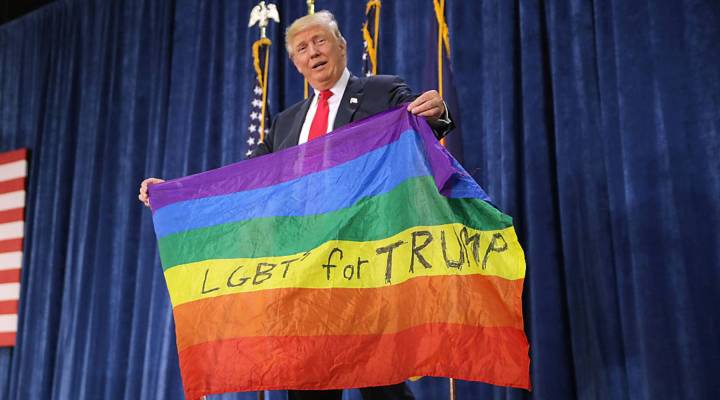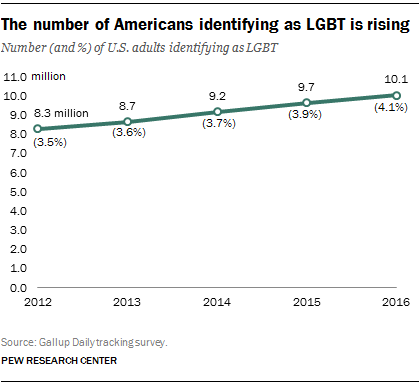
Do LGBT conservatives still have faith that Trump will protect workers’ rights?
Share Now on:
Do LGBT conservatives still have faith that Trump will protect workers’ rights?

Donald Zarda died years before Donald Trump was elected president, but the two Donalds found themselves intertwined last week thanks to a brief filed by the Department of Justice.
Back in 2010, Zarda, a trained skydiving instructor, was getting ready to make a tandem jump. It should’ve been a typical day at work for him. As he and a female client prepared, Zarda shared with her that he was gay so as to avoid any potential awkwardness while she was strapped to his chest for the duration of the jump. The disclosure backfired. The woman’s husband complained and Zarda’s employer, Altitude Express, fired him. Zarda sued, claiming that the company had violated Title VII of the 1964 Civil Rights Act.
As the case made its way through the system, Zarda passed away in 2014 in a base-jumping accident but the federal lawsuit remained. And then last week, amid the news of potential health care repeal, attempts to stem leaks from the White House and a ban on transgender individuals serving in the military, the Department of Justice filed a brief siding with Altitude Express. The Civil Rights Act does not protect employees from discrimination based on sexual orientation, the Department of Justice argued in the brief. There is currently no nation-wide law protecting lesbian, gay, bisexual and transgender (LGBT) employees from workplace discrimination.
The Justice Department brief comes six months into Trump’s presidency which some expected would expand protections for the LGBT community rather than roll them back. Early on, Trump appointed Jeff Sessions, who opposed same-sex marriage while serving in the Senate, to the post of attorney general of the United States. And more recently, the Trump administration declared a ban on transgender members of the military.
Unlike other Republican presidential candidates, Trump openly courted the LGBT vote while out on the campaign trail — holding a rainbow pride flag at a campaign rally, stating that the matter of same-sex marriage was “settled” and promising that he will “fight” for the LGBT community.
Thank you to the LGBT community! I will fight for you while Hillary brings in more people that will threaten your freedoms and beliefs.
— Donald J. Trump (@realDonaldTrump) June 14, 2016
Members of the LGBT conservative community still see potential for the Trump administration to protect LGBT rights, even if they are not a priority.
“I do not believe that LGBT issues are something that Trump spends all of his time in the day and throughout the night obsessing on,” said Gregory T. Angelo, president of the Log Cabin Republicans, a national organization representing gay conservatives. “We know that there are other things that the president obsesses about. And I don’t think that it is LGBT issues. However, it is a president’s job to represent the entirety of the American populous and that includes LGBT individuals and if legislation moves and ends up on his desk that recognizes LGBT nondiscrimination, he would need to address that.”
The LGBT community is not an insignificant pool of voters. In 2016, about 10.1 million American adults identified as LGBT, according to the Pew Research Center. That’s up from 8.3 million in 2012.
After Trump’s November victory, there was hope among LGBT conservatives that he would push to expand protections for the community, especially in the workplace. Some even traveled to the capitol in January to see him sworn in and attended events such as the Gay Deploraball.
The ban on transgender members of the military and the brief were “a one-two punch from the administration that really shows the forces that are at work in this administration,” said Sharon McGowan, who is a director of strategy and head of the Washington D.C. office for Lambda Legal, a nonprofit organization focused on LGBT issues. She also previously served as principal deputy chief of the Appellate Section of the Civil Rights Division in the Department of Justice.
“You have the Justice Department filing a brief saying that the federal nondiscrimination law that prohibits sex discrimination and employment should be construed in the most narrow way possible to make sure that it does not actually provide protections for LGBT people,” she explained. McGowan added that this brief comes after a number of courts have ruled that discrimination based on sex as covered under Title VII extends beyond gender to sexual orientation. Firing someone for having same-sex partners or for transitioning from gender to another while on the job is sex discrimination, she said.
Earlier this year, in a case brought by Lambda Legal, the 7th Circuit Court of Appeals ruled that discrimination based on sexual orientation is a form of sexual discrimination.
“Any discomfort, disapproval, or job decision based on the fact that the complainant — woman or man — dresses differently, speaks differently, or dates or marries a same-sex partner, is a reaction purely and simply based on sex,” Judge Diane Wood wrote in the majority decision. “That means that it falls within Title VII’s prohibition against sex discrimination, if it affects employment in one of the specified ways.”
The Equal Employment Opportunity Commission — which enforces federal laws that make it illegal to discriminate against a job applicant or an employee on the basis of religion, nationality, race, sex, or age — has also interpreted Title VII as providing protection from discrimination against LGBT employees. The commission previously filed a brief in support of Zarda.
However, in its brief, the Department of Justice insisted that “the EEOC is not speaking for the United States.”
“The brief that was filed by the Department of Justice — aside from being unnecessary — does highlight the fact that we do have an absence of Federal LGBT non-discrimination legislation,” said Angelo. According to him, expectations regarding what the White House might do as far as expanding protections for the LGBT community have not changed. He hopes that if Congress could get together to pass a Federal LGBT non-discrimination legislation, Trump would sign it.
“It is a legislation that the president has indicated he would support in the past and going back to the 2016 election cycle, he had stated that he did not feel gay people should be discriminated against in the workplace,” said Angelo. He added that such legislation needs to come from “a center right ideology” and be crafted by Republicans. “Then, and only then, would you have a viable chance that such legislation would move and end up on the president’s desk and if it does, it’s my hope that he would sign such a measure.”
Unlike Angelo, McGowan is skeptical that such legislation could make its way through the current Congress.
“In this moment in time right now, where you have this Senate willing to stay up until 3 o’clock in the morning to figure out which version of health care devastation they want to inflict on the American people as a whole, I am not optimistic that in this current environment that you will see legislation actually make it over the finish line,” she said.
Although, she points out, a majority of Americans support such legislation.
A 2016 poll by the Public Religion Research Institute found that 72 percent of Americans support a law that would protect LGBT people from discrimination. Breaking this down along political lines shows that 78 percent of Democrats and 62 percent of Republicans are in favor of such anti-discrimination laws. And, actually, 80 percent of people incorrectly believe that there is currently a law that protects LGBT Americans from being fired for being gay, lesbian, bisexual, or transgender.
“Every time that we win the case in court you know we have people coming back with a response of: ‘Well, I can’t believe you actually even had to sue over that. I actually thought that was the law,’” said McGowan. “We need to continue to bring our cases to court because we are winning.”
It is why, later this summer, Lambda Legal will ask the Supreme Court to hear the case of Jameka Evans, who claims that she was fired by Georgia Regional Hospital because she is a lesbian.
If it were left up to the Department of Justice, this matter would be settled in Congress rather than the Supreme Court.
“Any efforts to amend Title VII’s scope should be directed to Congress rather than the courts,” the Department of Justice wrote in last week’s brief.
Correction: This post has been update to correct the name of the plaintiff in the case that Lambda Legal will be taking to the Supreme Court later this summer.
| The costs of allowing transgender people in the military are not “tremendous” |
| The push to have better workplace protections for the LGBT community |
There’s a lot happening in the world. Through it all, Marketplace is here for you.
You rely on Marketplace to break down the world’s events and tell you how it affects you in a fact-based, approachable way. We rely on your financial support to keep making that possible.
Your donation today powers the independent journalism that you rely on. For just $5/month, you can help sustain Marketplace so we can keep reporting on the things that matter to you.













